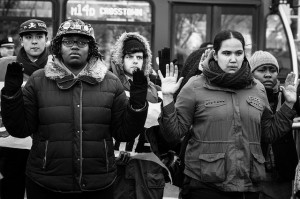
The tragedies that drew thousands of people into the streets in cities around the country this past weekend have also prompted soul-searching in the education reform movement.
If our goal is to respond to the educational needs of disadvantaged communities, can we ignore the other injustices in their lives? How can we help transform the institutions that failed Eric Garner, long before he died at the hands of New York City Police?
Derrell Bradford, executive director of the New York Campaign for Achievement Now, wrote this reaction to the non-indictment of the officers responsible for Garner’s death, which is worth reading in full:
These children, overwhelmingly black and brown, are financial assets of the highest order. Despite this, they graduate from high school with limited economic possibilities and, very likely, broken souls. And like many other young black men whose God-given potential has been squandered in schools with long histories of underperformance, they act out in a manner that ultimately becomes criminal. Here we find Garner, who despite being described by his minister as a “gentle giant,” was arrested almost 30 times during his life-cut-short, and more than once for selling loose cigarettes. And while he spent nights in local precincts, and other men like him spent nights in prisons, they again gave the city and the state the right to tax on their behalf. This time, however, it was not for his or their own freedom or safety, but for the ostensible freedom and safety of others. According to Pew, in 2010 black men were six times as likely to be incarcerated as white men. In New York City it costs $167,000 a year to keep a person jailed. The average corrections officer with 10 years on the job makes $60,000 annually.

This, Bradford says in an interview, ought to be a wake-up call for anyone committed to “helping people be free intellectually and in their person. That’s a higher-level discussion for a movement, but there’s never been a better time to have it.”
“I’m deeply concerned that people think Tweeting out #blacklivesmatter means that they have done their part,” he says. “I’m also deeply concerned that there is no clear articulation to a goal in lots of the protesting.”
People in education movements should do a better job listening to the communities they’re trying to serve. On that count, Bradford has words of caution for education reformers looking to channel their anger or despair into action.
“I think we have to be very cognizant of the fact that we could look like we’re being opportunistic,” he says. “It should be thoughtful. It should be done in a way that respects the people who we want to partner with.”


